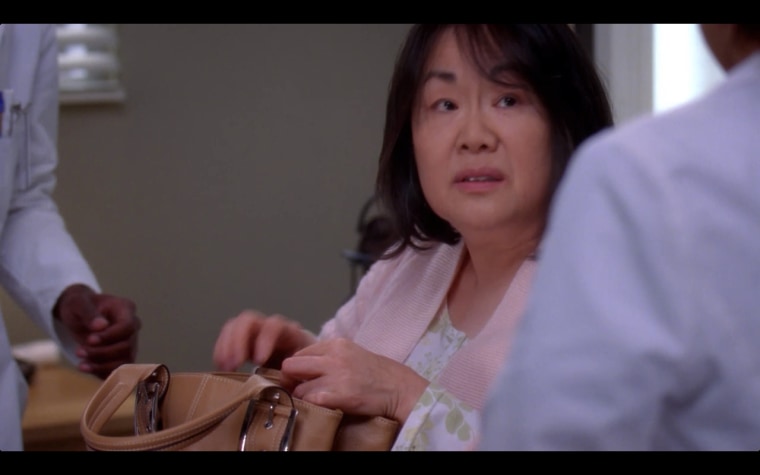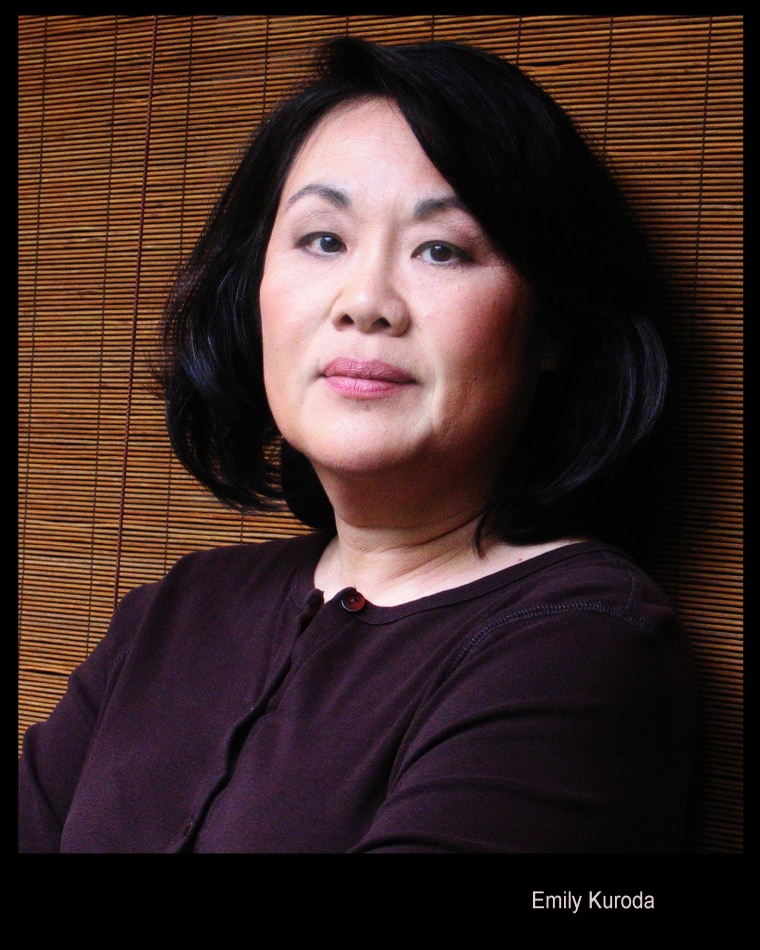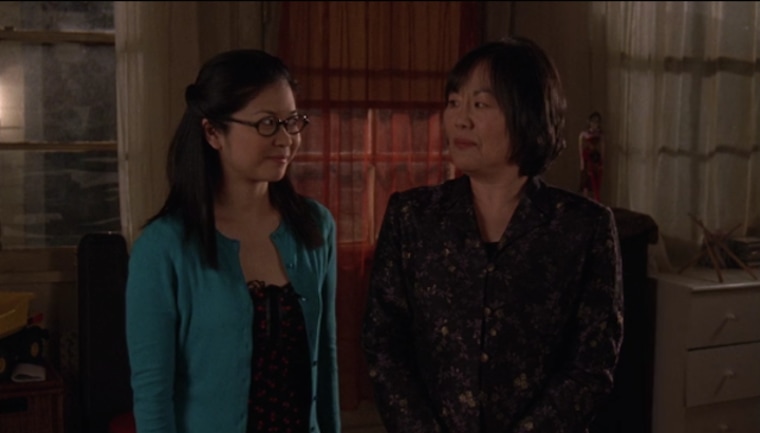Although "Gilmore Girls" has been off-air for nearly a decade, the fandom behind the show has remained strong. Last month, Netflix officially confirmed the beloved show will return for four 90-minute episodes this year.
At its core, “Gilmore Girls” is about the relationships between mothers and daughters — a story that is told beyond the titular Gilmore women. The characters of Lane Kim (portrayed by Keiko Agena) and Mrs. Kim (portrayed by Emily Kuroda) serve as a foil in the first few seasons for the easygoing, friend-like relationship between main characters Lorelei and Rory — both who are confirmed to be part of the Netflix revival.
Kuroda, who along with Agena are confirmed to be part of the Netflix revival, is a veteran of the entertainment industry, having worked in theater and television for more 30 years.
In an interview with NBC Asian America, Kuroda — who is a veteran of the entertainment industry, having worked in theater and television for more 30 years — opened up about her career and her "Gilmore Girls" character while often breaking into laughter and describing herself as "shy."
How did you get into acting?
I probably didn’t talk in public until eighth grade, and then in high school I started doing oral interpretation — kind of like monologues. Through theater and plays, I started coming out of my shell. In high school I directed some, and in college, I was a theater major, but they told me I had to teach.
The thought of me wanting to act was not an option when I was growing up, so I was getting my teaching credential. Then people from East West Players [an Asian-American theater organization based in Los Angeles] came up, and I said, “What’s this? You guys are performing?” So I moved to LA and I joined East West Players. Even though I graduated, I was getting my master’s [degree] in theater at Cal State Fresno.
They said all I could do with a master’s was teach. When I moved to LA and joined East West Players, I started acting professionally. They were wrong.

What did your parents think about your decision to pursue a career in acting?
"They said all I could do with a master’s was teach...They were wrong."
Our family struggled. After the war, we were very poor. My mother’s from Japan and her English wasn’t very good. Back then she worked at a sewing factory, and we worked on our vegetable farm. They were so busy working and making a living and putting food on the table that they really didn’t care. We kind of monitored ourselves. We made our own rules, me and my two brothers.
The cool thing about East West Players was that it gave you a soft place to land. Mako was the artistic director then, and he kind of took us under his wing. There’s a bunch of us, probably about 20 of us, that worked seven days a week at the theater and studied together for about 10 years. Because we weren’t alone, we had the strength of our community, it wasn’t bad. We got together. We put on our own productions. We got a lot of awards and we were nationally praised. It was a good time.
You’re been in the industry for so long now. What do you think about the increase in Asian representation we’ve been seeing on television?
When I was growing up, I saw Miyoshu Umeki in “The Courtship of Eddie’s Father,” and that was about it. Jack Soo, but he had to take a Chinese name. That was it! And now, a lot of series have Asians on them as series regulars. Still not big parts, unfortunately, but we’re getting there.
RELATED: 2015 Was More Than Just a Banner Year for Asian Americans on Television
I was in one of the first sitcoms that had a lot of Asians in it. It was called “Gung Ho” on ABC. So there was “The Courtship of Eddie’s Father,” and then 10 years later there was “Gung Ho.” Ten years later, there was a Margaret Cho show. So compared to that, now we have “Dr. Ken,” my friend Francois Chau is doing a new pilot for NBC, we’ve got “Fresh Off The Boat,” we’ve got Aziz Ansari’s show...
What’s harder: television or comedy?
I’ve been doing a lot of stage lately. I like them both. TV is harder, I think. Sometimes we get the scripts the night before, and I’m not that quick anymore. You look at a normal script, and it’s like 100 pages, and then you look at a “Gilmore” script, and it’s like 200 pages because people talk so fast. Although it was a lot of fun, it was hard. You don’t really get to rehearse. You have to work perfect, be fast, hit your mark, and say it.
RELATED: 'Master of None' Named Best Comedy at Critics' Choice Awards
How involved were you in the storytelling of the show? I remember when I first started watching “Gilmore Girls,” I was excited to see Asian faces on-screen, but there was also trepidation that Mrs. Kim would be another stereotype.
Luckily Helen Pai, one of the producers of the show — it’s her story! When I went in, I went in with a Korean accent, and the creator was like, “What are you doing?” I said, “A Korean accent,” and she said, “No, no, no it has to be more of a military, a general kind of thing.” They fought against what Hollywood normally wanted in an Asian mom.
That was so great! When I went in to the audition, and Amy [Sherman-Palladino, the creator of the show] went, “What are you doing?” I thought, “I like you!"

What is the response you get from people about Mrs. Kim?
Actually, most people like her. I’m surprised! She’s so mean oftentimes in the show. The thing is, it comes out of love, and luckily they supported that undertone so she was more than just a mean mom.
Tough love is universal! Does anyone tell you she reminds you of their own moms?
I get that a lot, mostly from people who aren’t from Asian families. I guess it’s also because a lot of immigrant families come into the United States. If you’re not tough, you’re not going to survive. You want your children to do well.
As the show progresses, we see there’s a lot more depth to Mrs. Kim and her relationship with Lane. She’s not just the super strict, religious figure we see in the first season. How much input did you have on your character?
I never said anything, because I’m kind of shy still, but as the years progressed — seven years — I think it was a two-way street. They got to know me, I got to know them. The writing just kind of melded together, this relationship that Lane and I had. Watching me, they got to pick what they thought my strengths were, and play to them.
RELATED: Asian-American Talent Comes Together for 'The Comedy Comedy Festival'
Did you stay in touch with Keiko after the last season of “Gilmore Girls”?
I did. In fact, we’ve done a couple things together. I produced a show that she was in — we didn’t act together — but she was involved in it. We’ve done some performance art shows together. One time, I was a mama bird and she was a baby bird. She’s done a lot of comedy. She’s doing a lot of improv now. We travel in the same circles, so we have a lot of the same friends. We’re still close.
Are we allowed to ask any questions about the upcoming Gilmore Girls revival?
Oh my god, we had the best time! We got together last month, and I couldn’t believe the people — everyone I know of said yes. Even though people were in New York, they were on speaker phone, it was a wonderful reunion of everyone.
I had thought, “My god, the characters that have gone through Stars Hollows in seven years, how are you going to pick who gets to be in these four 90-minute episodes?” But they crammed a lot in!
And the writing is great, because in the last year of “Gilmore,” Amy was no longer involved, and I didn’t like that. But she’s back on board, and I think she is the heart of the show. Artistically, she is so demanding of her fellow artists — from tech, script, actors...she is so demanding, but I think it pays off. She’s back on board, and I was so happy to see her and her husband Dan, who’s going to direct the episode I’m in.
I think her absence was definitely missed in the last season.
You too?! We would say, “We have to do it this way,” and they would say, “No there’s no money. You can’t.” Stuff like that, the whole year! People were paraphrasing, which we were not allowed to do [with Amy], but when Amy wasn’t there, people were paraphrasing, and it just wasn’t the same. It lost that crispness, you know? The audience either catches it or they don’t, but we don’t slow down for them. Everything kind of changed, so I wasn’t really surprised when [the show] went away after that.
This interview has been edited for length and clarity.
Follow NBC Asian America on Facebook, Twitter, Instagram, and Tumblr.
